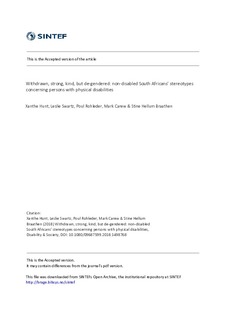| dc.contributor.author | Hunt, Xanthe | |
| dc.contributor.author | Rohleder, Poul | |
| dc.contributor.author | Braathen, Stine Hellum | |
| dc.contributor.author | Swartz, Leslie | |
| dc.contributor.author | Carew, Mark | |
| dc.date.accessioned | 2018-12-06T07:45:17Z | |
| dc.date.available | 2018-12-06T07:45:17Z | |
| dc.date.created | 2018-12-04T12:38:28Z | |
| dc.date.issued | 2018 | |
| dc.identifier.citation | Disability & Society, 2018, pp 23 | nb_NO |
| dc.identifier.issn | 0968-7599 | |
| dc.identifier.uri | http://hdl.handle.net/11250/2576250 | |
| dc.description.abstract | The present paper examines stereotyping in relation to physical disability and gender in the South Africa. Cross-sectional data for the present study were gathered using free response items in a large survey (n = 1990) examining the attitudes of people without disability towards different facetsof sexuality and disability. The most prominent stereotypes found in thepresent study were those which characterised PWPD as withdrawn and shy, SuperCrips, or happy, funny, and kind. The findings in the present papersuggest that stereotypes of PWPD are not overwhelmingly de-sexualising, but are undifferentiated by gender. | nb_NO |
| dc.language.iso | eng | nb_NO |
| dc.title | Withdrawn, strong, kind, but de-gendered: Non-disabled South Africans’ stereotypes concerning persons with physical disabilities | nb_NO |
| dc.type | Journal article | nb_NO |
| dc.type | Peer reviewed | nb_NO |
| dc.description.version | acceptedVersion | nb_NO |
| dc.source.pagenumber | 23 | nb_NO |
| dc.source.journal | Disability & Society | nb_NO |
| dc.identifier.doi | https://doi.org/10.1080/09687599.2018.1498768 | |
| dc.identifier.cristin | 1638933 | |
| cristin.unitcode | 7401,90,25,0 | |
| cristin.unitname | Helse | |
| cristin.ispublished | true | |
| cristin.fulltext | original | |
| cristin.qualitycode | 1 | |
